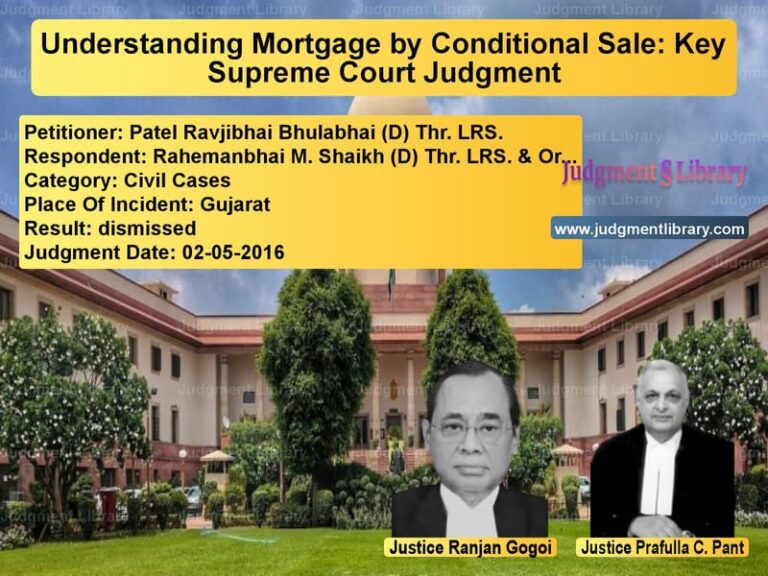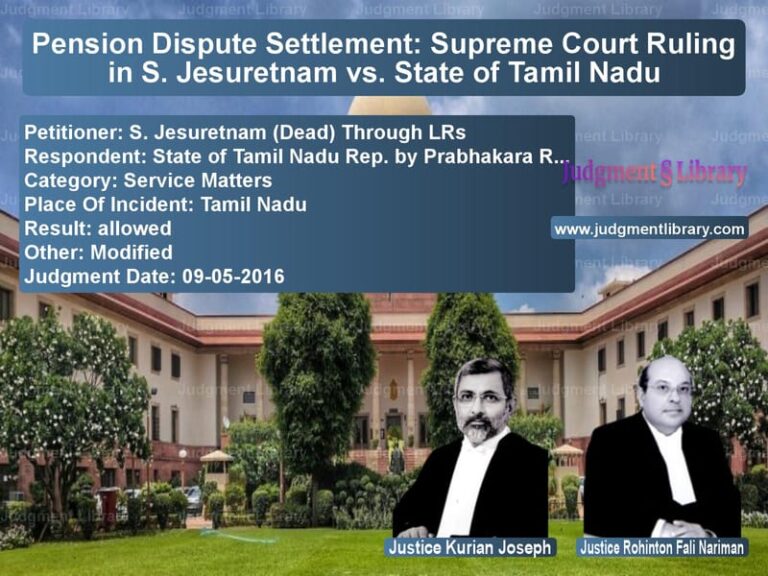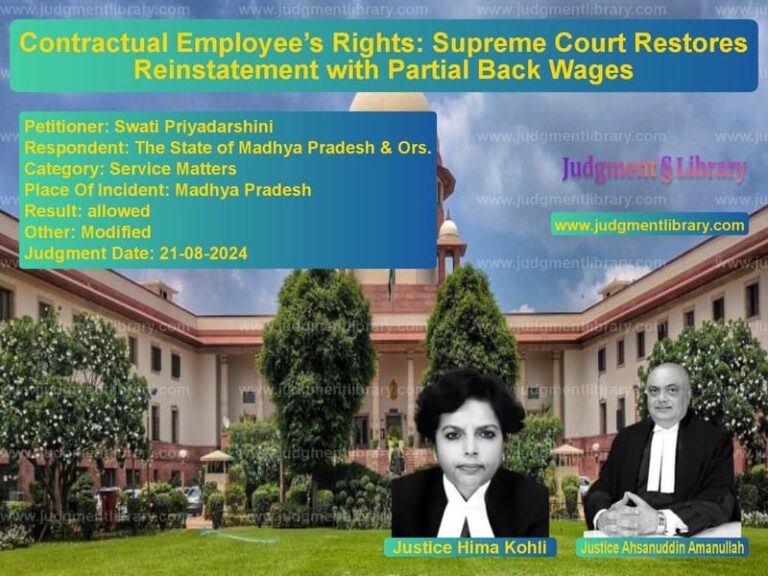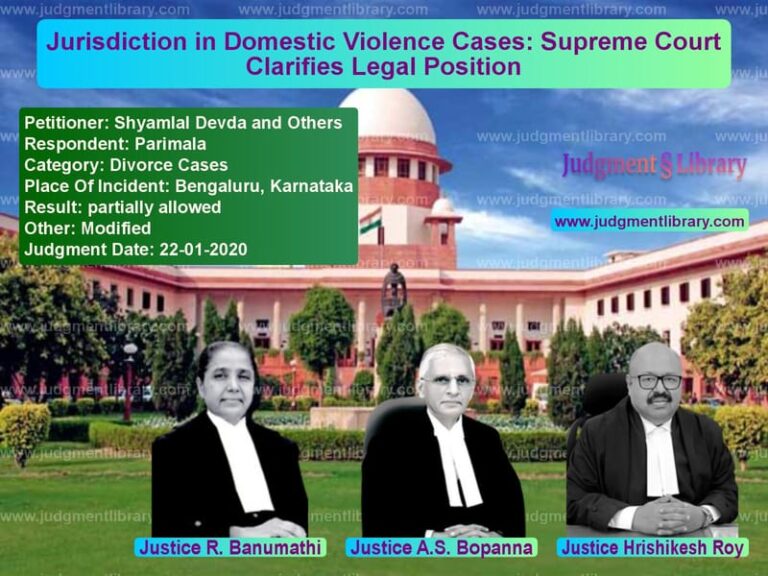ONGC Employees’ Pension Dispute: Chairman-Cum-Managing Director ONGC Ltd. vs Consumer Education Research Society
This case involves a dispute between the Chairman-Cum-Managing Director of ONGC Ltd. and the Consumer Education Research Society concerning the entitlement of ONGC employees to benefits under the Self Contributory, Post-Retirement, and Death-in-Service Benefits Scheme (1991). The issue in question was whether a relationship of consumer and service provider existed between the ONGC and the claimants, who were employees of the organization. The claimants argued that ONGC was liable to pay amounts under the scheme, but the appellants contended that the ONGC was not responsible for providing the service as defined under the Consumer Protection Act.
Key Facts of the Case:
- The claimants were employees of ONGC who had contributed to the Self Contributory Scheme, introduced in 1991. The scheme was voluntary and aimed at providing post-retirement benefits to ONGC employees, including family pension.
- After the employees’ retirement, the claimants faced delays and losses due to improper management of the fund and the delay in sending their claims to the Life Insurance Corporation (LIC).
- The Consumer Education Research Society filed the case, seeking compensation and benefits for the claimants under the scheme.
- The main question was whether the relationship between the claimants (ONGC employees) and ONGC was one of consumer and service provider under the Consumer Protection Act, 1986.
Petitioner and Respondent Arguments:
Petitioner (ONGC Ltd.): The petitioner argued that the employees were not “consumers” under the definition provided by the Consumer Protection Act, as they were not paying for the service provided by ONGC but were instead contributing to a fund. The petitioner contended that the scheme was voluntary, and no contractual obligation existed between ONGC and the employees in a service capacity.
Respondent (Consumer Education Research Society): The respondents argued that ONGC was liable to the employees as a service provider under the Consumer Protection Act. They contended that the company had a duty to fulfill its contractual obligations to its employees and that the claimants, who had contributed to the scheme, should receive the entitled benefits, including family pension and other accrued amounts.
Important Judge Arguments:
Justice S. Abdul Nazeer: Justice Nazeer noted that the self-contributory pension scheme was based on voluntary contributions and operated by a Trust, not ONGC itself. He emphasized that while the ONGC was not directly responsible for the employees’ claims, it had an obligation to ensure that the Trust operated effectively. However, he stated that there was no relationship of consumer and service provider between the claimants and ONGC, as defined under the Consumer Protection Act.
Justice Deepak Gupta: Justice Gupta concurred with Justice Nazeer, emphasizing that the claimants were not “consumers” as per the Act. The judge also pointed out that the relationship between ONGC and its employees was not one of service provision in the commercial sense. He further agreed that the ONGC was not liable to provide the benefits under the Consumer Protection Act, but it still had a moral and legal obligation to ensure the proper management of the pension fund.
Legal Provisions Discussed:
- Section 2(d) of the Consumer Protection Act, 1986: Defines “consumer” as a person who avails services for a consideration, which is paid or promised. The petitioners argued that the ONGC employees were “consumers” based on their contribution to the scheme.
- Section 2(o) of the Consumer Protection Act, 1986: Defines “service” as any description of service made available to users, but excludes services rendered free of charge or under a contract of personal service. This provision was critical in deciding whether the relationship between the employees and ONGC could be classified as a consumer-service provider relationship.
- The Self Contributory, Post Retirement and Death-in-Service Benefits Scheme (1991): This scheme allowed ONGC employees to contribute towards a pension fund, but it did not establish a contractual obligation that would constitute a service provider relationship under the Consumer Protection Act.
Final Judgment:
The Supreme Court dismissed the appeals, agreeing that no consumer-service provider relationship existed between ONGC and its employees. The Court emphasized that the scheme was voluntary, and the employees’ contributions did not create a contractual relationship as defined under the Consumer Protection Act. However, the Court also noted that ONGC had an obligation to ensure that the fund was managed properly. The judgment affirmed that the impugned orders by the National Consumer Disputes Redressal Commission and State Consumer Disputes Redressal Commission were incorrect in determining a consumer-service provider relationship but upheld the need for ONGC to address the payment of amounts due to the claimants.
Conclusion:
The decision of the Court clarifies the scope of the Consumer Protection Act and its applicability to relationships within organizations like ONGC. While ONGC is not liable under the Act, the Court recognized the organization’s responsibility to ensure that the pension funds were managed fairly. This case highlights the importance of clear contractual obligations in defining the nature of a service-provider relationship and the limits of consumer rights in such contexts.
Petitioner Name: Chairman-Cum-Managing Director ONGC Ltd..Respondent Name: Consumer Education Research Society.Judgment By: Justice S. Abdul Nazeer, Justice Deepak Gupta.Place Of Incident: New Delhi.Judgment Date: 09-12-2019.
Don’t miss out on the full details! Download the complete judgment in PDF format below and gain valuable insights instantly!
Download Judgment: Chairman-Cum-Managin vs Consumer Education R Supreme Court of India Judgment Dated 09-12-2019.pdf
Direct Downlaod Judgment: Direct downlaod this Judgment
See all petitions in unfair trade practices
See all petitions in Company Law
See all petitions in Corporate Governance
See all petitions in Judgment by S. Abdul Nazeer
See all petitions in Judgment by Deepak Gupta
See all petitions in partly allowed
See all petitions in supreme court of India judgments December 2019
See all petitions in 2019 judgments
See all posts in Corporate and Commercial Cases Category
See all allowed petitions in Corporate and Commercial Cases Category
See all Dismissed petitions in Corporate and Commercial Cases Category
See all partially allowed petitions in Corporate and Commercial Cases Category







